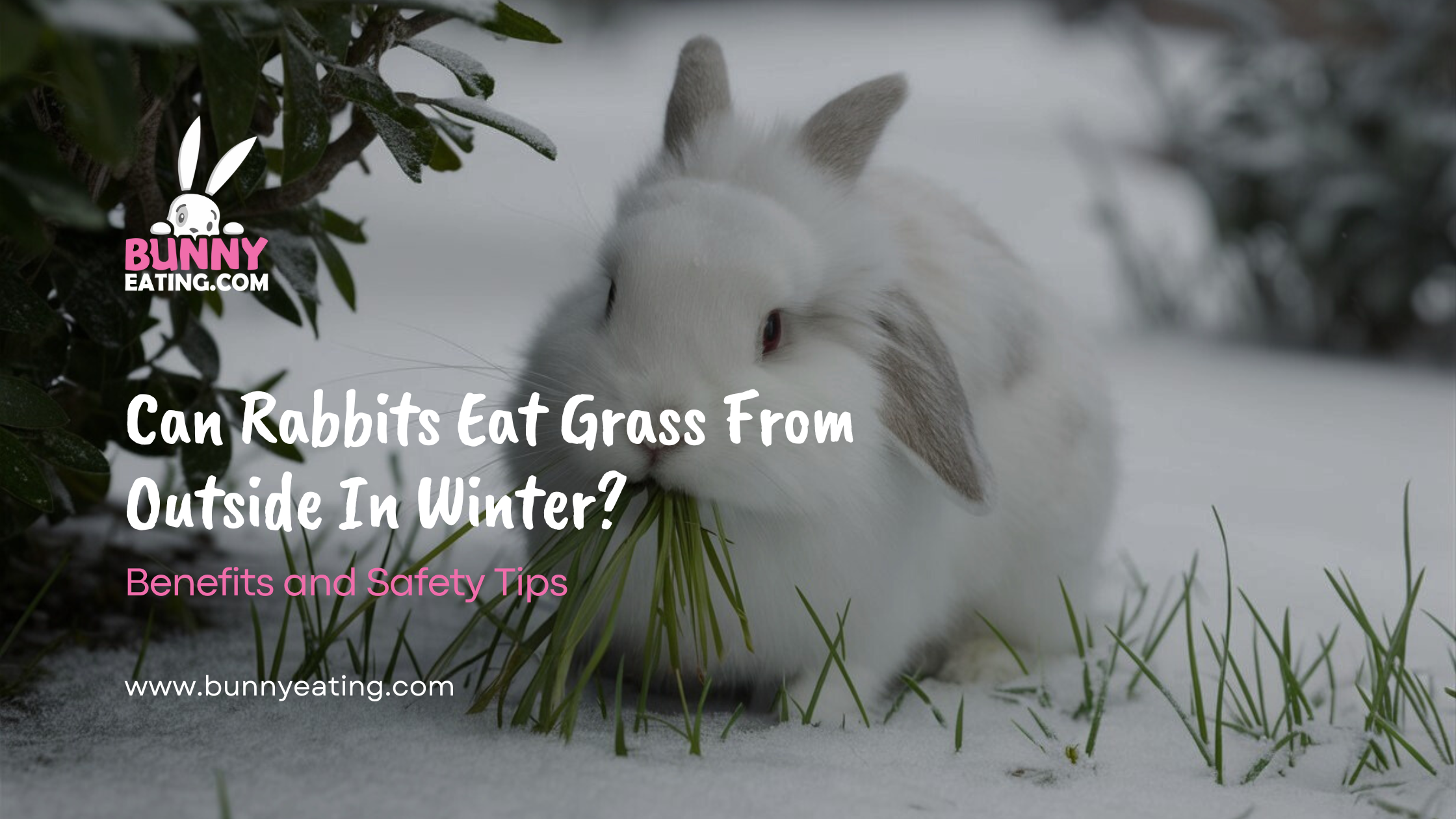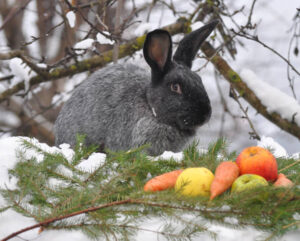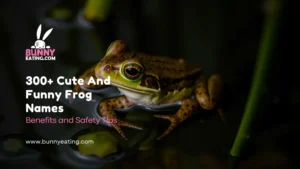In the wintertime, rabbits can indeed consume grass that has been left outside, but they must be careful to make sure that the grass is free of poisons, chemicals, and pesticides. Also, make sure that the grass is not ice-covered in locations where there is snow, as rabbits may find it hard to get to it. It’s safer to provide your rabbit with an alternative over the winter, like hay or dried grass, to make sure their nutritional needs are met. Can Rabbits Eat Grass From Outside In Winter?
Safe Alternative to Rabbit Eating Grass
A safe alternative to rabbits eating grass is providing high-quality hay, such as timothy hay, orchard grass, or meadow hay. These alternatives offer similar nutritional benefits to fresh grass and are free from potential contaminants that outdoor grass may carry.
Risks of Feeding Grass
The rabbits who are fed grass run the risk of coming into contact with the drugs, chemicals, pesticides, and worms that reside in the grass. Also, grass from places other animals visit could be tainted with harmful bacteria. Before giving the grass to your rabbit, make sure it is clean and clear of any potential threats.
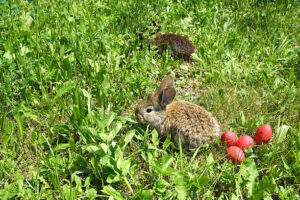
Effects of Grass on Rabbits
Grass provides essential fibre and nutrients to rabbits, promoting digestive health and dental wear. However, if contaminated, grass can cause digestive issues, bacterial infections, or toxicity in rabbits.
Are Grass Good for Rabbits?
Yes, the grass is generally good for rabbits as it provides essential fibre, aids in digestion, promotes dental health, and offers enrichment through grazing behaviour. However, ensuring the grass is free from contaminants is crucial for the health of your rabbit.
Nutritional Value of Grass for Rabbits
The grass is rich in fibre, which is essential for maintaining proper digestive function in rabbits. It also contains vitamins, minerals, and proteins necessary for overall health and well-being.
How is Grass Made?
Grass grows from seeds planted in the soil. With proper sunlight, water, and nutrients, grass sprouts, grows, and eventually produces seeds for reproduction. It’s a natural process crucial for sustaining various ecosystems and providing food for many animals, including rabbits.
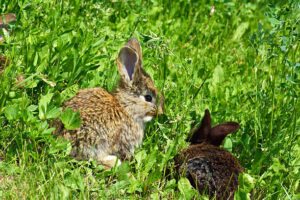
What Types of Grass Are Safe for Rabbits?
Safe grass types for rabbits include varieties like timothy grass, orchard grass, meadow grass, and bermudagrass. These grasses are low in sugars and high in fibre, making them suitable for rabbit consumption.
Do Wild Rabbits Eat Grass?
Yes, wild rabbits primarily feed on grass along with other vegetation like herbs, weeds, and leafy greens. Grass forms a significant part of their natural diet, providing essential nutrients for their survival.
Why are Grass Harmful to Rabbits?
Grass can be harmful to rabbits if contaminated with pesticides, chemicals, or toxins. Additionally, grass that is too rich or high in sugars can cause digestive issues like bloat or diarrhoea in rabbits.
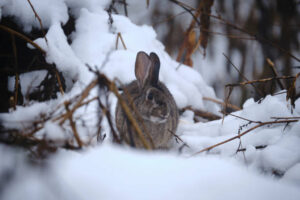
Store-Bought Grass and Rabbits
Store-bought grass, such as timothy hay or orchard grass, is a safe option for rabbits as it undergoes quality control measures to ensure it’s free from contaminants. It provides a convenient and reliable source of nutrition for pet rabbits.
How Often Can My Rabbit Eat Grass?
Rabbits can eat grass daily as part of their diet. However, it’s essential to monitor their intake and ensure the grass is clean and free from any potential hazards.
How much grass is there?
There are numerous grass species worldwide, each with its unique characteristics and growing conditions. Some common grass types include timothy grass, bermudagrass, ryegrass, and fescue grass.
How to Introduce Your Bunny to Fresh Foods?
When introducing fresh foods to your rabbit, start with small amounts and gradually increase the variety over time. Monitor their response to each new food to ensure it agrees with their digestive system.
Rabbit Safe Chewing Materials Include
Safe chewing materials for rabbits include untreated wood blocks, apple branches, and cardboard tubes. These materials help promote dental health and prevent boredom in rabbits.
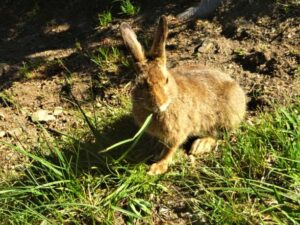
Preparing Grass for Rabbits
Before offering grass to your rabbit, ensure it’s clean and free from contaminants. Wash the grass thoroughly and remove any potential hazards like pesticides or chemicals.
Feeding Guidelines and Amount
Offer grass as part of your rabbit’s daily diet, along with hay, fresh vegetables, and a small amount of pellets. The amount of grass can vary depending on your rabbit’s size, age, and activity level.
Best Practices When Feeding Rabbits Grass
Always provide clean, fresh grass to your rabbits and monitor their intake to ensure they’re not consuming contaminated or hazardous grass. Rotate the areas where you collect grass to prevent overgrazing and maintain a healthy grass supply.
What If My Rabbit Eats a Large Amount of Grass?
If your rabbit consumes a large amount of grass, monitor them closely for any signs of digestive upset, such as diarrhoea or bloating. Limit their access to grass until their digestive system has stabilized, and consult with a veterinarian if necessary.
How Much Grass Can My Rabbit Eat?
Rabbits can eat grass daily, and the amount can vary depending on their size, age, and dietary needs. As a general guideline, provide a handful of grass per day for an average-sized rabbit.
When Shouldn’t You Feed Grass to Your Rabbit?
Avoid feeding grass to your rabbit if it’s contaminated with pesticides, chemicals, or toxins. Additionally, if your rabbit has digestive issues or sensitivities, consult with a veterinarian before offering grass.
What If My Rabbit Accidentally Eats a Lot of Grass?
If your rabbit accidentally consumes a large amount of grass, monitor them closely for any signs of digestive upset or illness. Limit their access to grass and provide plenty of fresh water to help flush out their system.
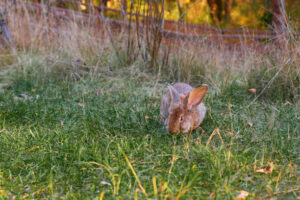
Monitoring Your Rabbit’s Health
Regularly monitor your rabbit’s health, including their appetite, activity level, and stool quality. Any changes in behaviour or physical condition should be addressed promptly with a veterinarian.
What Actions Should I Take If My Rabbit Consumes Grass?
If your rabbit consumes grass, ensure it’s clean and free from contaminants. Monitor their health closely for any signs of digestive upset or illness, and consult with a veterinarian if necessary.
What Else Can I Feed My Rabbit?
In addition to grass, you can feed your rabbit hay, fresh vegetables, a small amount of pellets, and occasional treats like fruits or herbs. Ensure a balanced diet to meet their nutritional needs.
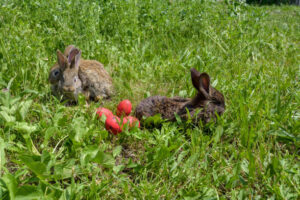
How to Create a Rabbit-Friendly Garden?
Create a rabbit-friendly garden by planting safe vegetation like herbs, leafy greens, and rabbit-safe flowers. Install fencing to prevent access to toxic plants, and provide shelter and hiding spots for your rabbit to explore.
Rabbit Treats Made at Home
You can make homemade rabbit treats using rabbit-safe ingredients like oats, fruits, and vegetables. Avoid using ingredients that are high in sugars or fats and consult with a veterinarian for suitable treatment options.
